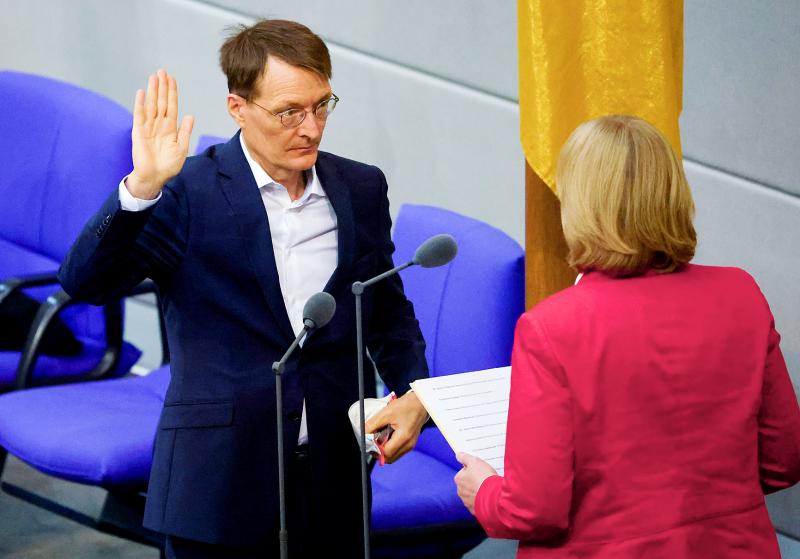A Harvard-educated epidemiologist with a penchant for red bow ties, Karl Lauterbach became a household name in Germany during the COVID-19 pandemic by using Twitter and television appearances to urge fast implementation of novel ideas to fight the coronavirus.
As Germany’s new health minister, the 57-year-old Social Democratic Party lawmaker would have to deliver more than words to a frustrated public expecting the new government of German Chancellor Olaf Scholz to carve a way out of the pandemic.
Praised during the first COVID-19 wave for keeping deaths and infections relatively low, Germany on Wednesday recorded 527 deaths in a fourth wave that has strained hospitals and forced authorities to restrict the unvaccinated.

Photo: Reuters
Health officials have welcomed Lauterbach’s appointment and said that his first priority should be to break resistance to vaccination in a country where only 69.2 percent of the population is fully inoculated compared with 87.3 percent in Portugal.
“The main challenge he faces is to convince those still unvaccinated to get vaccinated,” said Dirk Heinrich, chairman of Germany’s Virchowbund association of practicing physicians.
“He has to motivate them with a positive campaign and a simple message: ‘If you get vaccinated, you will be doing yourself and people around you a big favor,’” Heinrich said.
The outgoing government of former German chancellor Angela Merkel was criticized for fraught communication with the public during the pandemic, which resulted in confusion and frustration.
Critics pointed to the government’s decision in October to recommend boosters to people aged 60 or older, contradicting a scientific committee that had recommended the extra shots to those aged 70 or older.
Lauterbach urged the government in late summer to start offering boosters, pointing to Israel, which in July became the first country to launch a booster campaign.
In April, he pointed to studies showing the effectiveness of a single vaccine dose in reducing hospitalizations. Because vaccine doses were scarce when they first became available, he urged the government to space out to as much as 12 weeks the gap between the first and second jab so that more people received their first shot, a strategy first adopted in Britain.
His well-placed, maverick interventions and working class background — which has earned him more than 700,000 followers on Twitter — made him a credible voice among a public frustrated with the political elite.
During his first address to his staff at the German Ministry of Health on Wednesday, Lauterbach said that management of the pandemic would be guided by scientific evidence, not political considerations.
“Health policy can succeed only if it is anchored in scientific evidence. Our main goal is to end this pandemic. We will deliver booster shots as fast as possible,” he said.
Thorsten Benner of the Global Public Policy Institute said that Scholz had no choice but to appoint Lauterbach as health minister given his “pop star” status.
“I guess Scholz’s hope is that if Lauterbach succeeds in daily pandemic management, Scholz can focus on other governing priorities,” Benner said. “The alternative would be having to live with Lauterbach as a parallel health minister of the hearts.”

POLITICAL PRISONERS VS DEPORTEES: Venezuela’s prosecutor’s office slammed the call by El Salvador’s leader, accusing him of crimes against humanity Salvadoran President Nayib Bukele on Sunday proposed carrying out a prisoner swap with Venezuela, suggesting he would exchange Venezuelan deportees from the US his government has kept imprisoned for what he called “political prisoners” in Venezuela. In a post on X, directed at Venezuelan President Nicolas Maduro, Bukele listed off a number of family members of high-level opposition figures in Venezuela, journalists and activists detained during the South American government’s electoral crackdown last year. “The only reason they are imprisoned is for having opposed you and your electoral fraud,” he wrote to Maduro. “However, I want to propose a humanitarian agreement that

ECONOMIC WORRIES: The ruling PAP faces voters amid concerns that the city-state faces the possibility of a recession and job losses amid Washington’s tariffs Singapore yesterday finalized contestants for its general election on Saturday next week, with the ruling People’s Action Party (PAP) fielding 32 new candidates in the biggest refresh of the party that has ruled the city-state since independence in 1965. The move follows a pledge by Singaporean Prime Minister Lawrence Wong (黃循財), who took office last year and assumed the PAP leadership, to “bring in new blood, new ideas and new energy” to steer the country of 6 million people. His latest shake-up beats that of predecessors Lee Hsien Loong (李顯龍) and Goh Chok Tong (吳作棟), who replaced 24 and 11 politicians respectively

Young women standing idly around a park in Tokyo’s west suggest that a giant statue of Godzilla is not the only attraction for a record number of foreign tourists. Their faces lit by the cold glow of their phones, the women lining Okubo Park are evidence that sex tourism has developed as a dark flipside to the bustling Kabukicho nightlife district. Increasing numbers of foreign men are flocking to the area after seeing videos on social media. One of the women said that the area near Kabukicho, where Godzilla rumbles and belches smoke atop a cinema, has become a “real

‘WATER WARFARE’: A Pakistani official called India’s suspension of a 65-year-old treaty on the sharing of waters from the Indus River ‘a cowardly, illegal move’ Pakistan yesterday canceled visas for Indian nationals, closed its airspace for all Indian-owned or operated airlines, and suspended all trade with India, including to and from any third country. The retaliatory measures follow India’s decision to suspend visas for Pakistani nationals in the aftermath of a deadly attack by shooters in Kashmir that killed 26 people, mostly tourists. The rare attack on civilians shocked and outraged India and prompted calls for action against their country’s archenemy, Pakistan. New Delhi did not publicly produce evidence connecting the attack to its neighbor, but said it had “cross-border” links to Pakistan. Pakistan denied any connection to